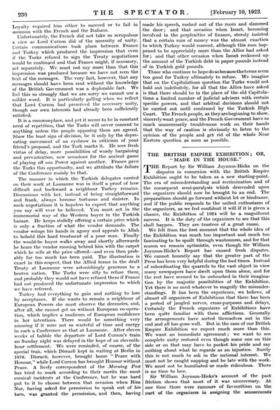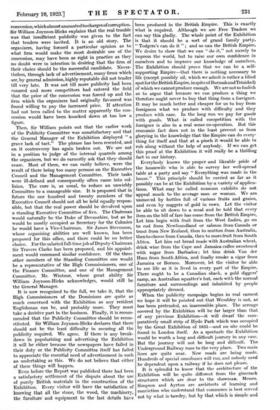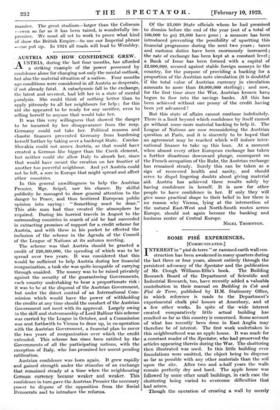THE BRITISH EMPIRE EXHIBITION ; OR, " MADE IN THE
HOUSE."
r11HE Report by Sir William Joynson-Hicks on the disputes in connexion with the British Empire Exhibition ought to be taken as a new starting-point. The era of misunderstanding and recrimination- and of the consequent semi-paralysis which descended upon the organizers should now be brought to an end, The preparations should go forward without let or hindrance, and if the public responds to the- united enthusiasm of the organizers, as we feel confident it will if it is given a chance, the Exhibition of 1921 will be a magnificent success. It is the duty of the organizers to see that this shall happen. They are- trustees of a great cause.
We felt from the first moment that the whole idea of the Exhibition was much too important and much too fascinating to be spoilt through wantonness, and for that reason we remain optimistic, even though Sir William Joynson-Hieks's Report has caused fresh disputes. We cannot honestly say that the greater part of the Press has been very helpful during the bad times. Instead of subordinating the quarrels to the vast object in view many newspapers have dwelt upon them alone, and for the rest have seemed to be untouched- in their imagina- tion by the majestic possibilities of the Exhibition. Yet there is no need whatever to magnify the misunder- standings. It has been the experience, we believe, of almost all organizers of Exhibitions that there has been a period of jangled nerves, cross-purposes- and delays. Certainly the French organizers of Exhibitions have been quite familiar with these afflictions. Generally the arrangements have sorted themselves out in the end and all has gone well. But in the case of our British Empire Exhibition we expect much more than this. We want an immediate agreement ; we want to see complete unity restored even though some one on this: side or on that may have to pocket his pride and say nothing about what he• regards as an injustice. Surely this- is not much to ask in the national interest. We must not be caught napping and be late with the work. We must not be humiliated or made ridiculous. There is -no- time to lose.
Sir William Joynson-Hicks's account of the past friction shows that most of it was unnecessary. At one time there were rumours of favouritism on the part of the organizers in assigning the amusements concession, which almost amounted tocharges ofcorruption. Sir William Joynson-Hicks explains that the real trouble was that insufficient publicity was given to the fact that tenders were invited. It is an old story. The organizers, having formed a particular opinion as to what firm would make the most desirable use of the concession, may have been as right in practice as they -too doubt were in intention in 'desiring that the 'firm. of their choice should be the successful candidate. Never- theless, through lack of advertisement, many firms which are, by -general admission, highly reputable did -not tender till very late. It was not till more publicity had been 'ensured -and more competitors had entered the field that the price of the concession was forced up and the -firm which the organizers had originally favoured was found willing to pay the increased price. If attention had not been called to the matter apparently the con- cession would have been knocked down at too low a figure.
Then, Sir William points out that the earlier work of the Publicity Committee was unsatisfactory and that the General Manager of the Exhibition displayed " a grave lack of tact." The phrase has-been resented,' and on it controversy has again broken out. We 'are not in a position -to judge of the internal quarrels among the organizers, but we do earnestly ask that -they- should cease. Most of them, we 'can easily -believe, were the result of there being too many persons on the Executive Council and the 'Management Committee. Their tasks were ill-defined and -consequently often -came into col- lision. The cure is, as usual, to reduce an unwieldy Committee to a manageable size. It is proposed that future the one -hundred and twenty members of 'the Executive Council should not all be held equally respon- sible, but that the real power should be devolved upon a standing Executive Committee of five. The Chairman would naturally be the Duke of Devonshire, but as he would be mostly occupied as Secretary for the Colonies he would have a Vice-Chairman. Sir James Stevenson, whose organizing abilities are well known, has been proposed for this office, and there could be no better choice. For the salaried full-time job ofDeputy-Chairman Sir Travers Clarke has been proposed, and his appoint- ment would 'command similar confidence. -Of the •three other members of the Standing Committee one would be a representative of the High Corrmissioners, one 'of the Finance Committee, and one of the Management Committee. Mr. Wintour, whose great ability Sir William Joynson-Hicks -acknowledges, would still be the General Manager.
It is -now recognized to the full, we take it, that the High Commissioners of the Dominions are quite as much concerned with the Exhibition as any resident Englishman can be, and probably - more. They must take a decitite part in the business. Finally, it is recom- mended that the Publicity Committee should be recon- stituted. Sir William Joynson-Hicks -declares that there should not be the -least difficulty in securing all the publicity required. We agree. If there is any break- down in popularizing and advertising the Exhibition it will be either because the newspapers have failed in their duty or the Publicity Committee itself has failed to appreciate the essential nee-d of advertisement in -such an undertaking as this. We do not 'believe that either of these things will happen.
Even before 'the Report was published 'there had been a satisfactory settlement of the dispute about the use of purely British materials in the construction of the 'Exhibition. Every visitor will have the satisfaction of knowing that all the stone, the wood, the machinery, the furniture' and •egnipnient to the last details have been produced in the British -Empire. This is exactly what is required. Although we are Free Traders we can say this gladly. The whole point of the Exhibition is that it should be a sort of grand family party. " Todgers's can do it " ; and so can the British Empire.
We desire to show that we can "-do -it," not merely to impress the world, but to raise our own confidence in ourselves and to improve our knowledge of ourselves.
The Exhibition should prove that we can be a self- supporting Empire—that -there is nothing necessary to life (except possibly oil, which we admit is rather a blind spot for the British Empire, in spite of Burmah and Trinidad) of which we cannotproduce enough. We are notso foolish as to argue that because we can produce a thing we therefore ought never to buy that thing from a foreigner. It may be much better and -cheaper for us to buy from foreigners what we produce with difficulty and they produce with ease. In the long --run -we pay for goods with goods. What is -called competition with the foreigner is also in a real sense co-operation. But this economic fact does not in the least prevent us from glorying in the knowledge that the Empire,ean do every- thing for .itself and that at a pinch it 'would be able to 'rub along without the help of anybody. If -we can get this proof at the Exhibition it -will -really be a thrilling fact in our history.
Everybody knows the ,proper and likeable pride of the housewife who is able to survey her well-spread table at a party and -say " Everything -was made in the house." This principle should be carried as far as it possibly can be at the Exhibition bya variety of applica- tions. What may be called museum exhibits do not appeal 'much to the average man or woman. We are unmoved by bottles full of various fruits and -grains, and even by nuggets of :gold 'in rows. Let the visitor be able to sit down to a -meal and be told that every item on the bill of fare has come from the British Empire.
Let him begin with fruit from -the West -Indies, go on to cod from Newfoundland or salmon from 'Canada or trout from New Zealand, then to mutton from Australia, then to cheese from Canada, then to more fruit from South Africa. Let him eat bread made with Australian wheat, drink wine from the Cape and Jamaica, coffee sweetened with sugar from Barbados ; let fhim drink Van der Hum from South Africa, and finally -smoke a cigar from Jamaica • or Borneo. Moreover, let the visitor be able to see life as it is lived in every -part of -the Empire. There ought to be a Canadian -shack, a gold diggers' camp, an Australian squatter's hut, each-with-the normal furniture and surroundings and inhabited by _people appropriately dressed.
When the publicity campaign begins in real earnest we hope it will -be pointed out that Wembley is not, as has been pretended, an inaccessible place. The acreage covered by the Exhibition will be -far larger than that of any previous Exhibition—it will dwarf the com- paratively small strip of Hyde Park which was occupied by the Great Exhibition of 1851—and no site could be found in London itself. As a spectacle the Exhibition would be worth along and difficult journey in any case.
But the journey will not be long and difficult. The Underground Railway runs to the very place. Two main lines are quite near. New roads are being made. Hundreds of special omnibuses will run, and nobody need be dependent upon a railway if 'he does not please.
It is splendid to know that the architecture of the Exhibition will be quite different from the gimcrack structures which are dear to the showman. Messrs. Simpson and Ayrton are architects of learning and conviction who understand that commerce is best served not by what is-tawdry, but by that which is simple and massive. The great stadium—larger than the Coliseum —even so far as it has been raised, is wonderfully im- pressive. We must all set to work to prov.e what kind of show the British Empire—to use our Imperial phrase —can put up. In 1924 all roads will lead to Wembley.




































































 Previous page
Previous page